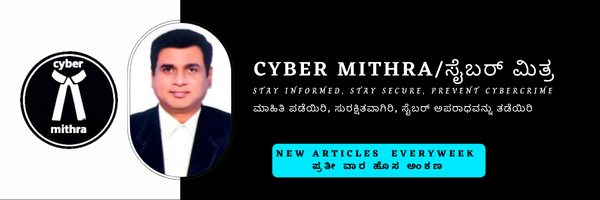Beware of new Investment cyber frauds
Fransis, a hotelier got a call from a person identifying himself as a relationship manager of a reputed stock broker firm where Fransis had a account. He talks about a new scheme where they get IPOs allotted in a bulk and then whoever is interested can get assured number of new IPO shares from them for a small commission. Since Fransis used to invest a lot in IPOs, he thought this is good deal as he would get guaranteed allotment and transferred 10 lakh rupees to the account number specified by him. Fraudster asked him to download a App, where he can check IPO allotment details, Fransis downloaded the App and was happy to see shares allotted to him for a popular IPO and then transferred another 50 lakhs for another IPO allocation. Later when he tried to sell the allotted shares, he faced issues. He contacted the customer support of his brokering firm, then he came to know that he had become a victim of a Investment fraud and the so called Relationship manager was a cyber criminal.
There has been many such new investment frauds, promising huge returns or guaranteed allotment of a scarce product or providing preferential tips on stock investment ideas recently. Cyber fraudsters may trick you into investing your hard earned money in stocks, bonds, notes, commodities, currency(Cryptocurrency), or even real estate by lying to you on returns or giving fake information or making you install a App or join a pre-curated Telegram/Whatsapp group or impersonating themselves as your bank/broking firm’s relationship manager or as a celebrity stock trader.
Common Investment Frauds :-
- Affinity Fraud: Scammers try to trick members of a group that has formed based on a common characteristic such as age, ethnicity, or religion. Scammers win the trust of the group leader and hope that if the group leader invests, others will invest too.
- High Yield Investment Programs: Scammers claim you’ll make high returns on your money if you invest with them. Often these investments aren’t real, or they’re really selling stocks that have almost no value.
- Pyramid Schemes: Scammers will tell you that a small investment can earn a large pay out—or profit. But you have to find others to invest too. The “profit” that you get is really just money paid by other investors. The scheme falls apart when the scammer runs out of new investors or takes all the money and runs.
- Ponzi Schemes: A scammer—usually a portfolio manager—says he will invest your money and earn you large pay outs. But the money you get is really just money paid by other investors. The scheme falls apart when the scammers can’t find any new investors to give them money.
- Pump and Dump: Scammers buy cheap stocks and lie to potential purchasers about the quality of the stocks to raise their prices. You might think these stocks are a good investment, so you buy them at a higher price. Then the scammer then sells off the stock at the higher price, the stock price drops, and you’re left with worthless stocks.
- Recovery Room Schemes: Scammers say they’ll help you get back money that you’ve lost in other investment schemes, but they want you to pay them first. After you pay them, they don’t do anything.
- Unsuitable Financial Products: A financial advisor may try to sell you something that earns them a lot of money but is not a good investment for you, for example most Unit Linked Insurance Plans(ULIP). More generally, some financial advisors may bill you for services you didn’t receive or products you didn’t ask for.
Precautions on how to protect oneself from Investment scams :-
- Always follow the principle of ‘ Zero Trust, Pause and Authenticate’ for all digital transactions and messages/offers from unknown people.
- If the returns assured is unbelievably higher than regular investments, then it may be a fraud.
- Confirm by calling Bank/Broker firm’s customer support number to verify on the authenticity of the investment before investing.
- Beware of aggressive, pushy salespeople who want your answer/confirmation, money, or signature right away.
- Do some research, check online about feedback on any new investment offers made to you before investing.
- Do not share your Aadhaar and PAN card details or Credit/Debit card details with strangers or on websites or Apps which you are dealing first time.
- Never click on a hyperlink or scan a QR code or install any App provided in a message or mail by a stranger.
If you are a victim of such fraud :-
Immediately call 1930 cyber helpline or file a complaint at cybercrime.gov.in website or nearby police station. Report and lodge a complaint with the bank/broker website about the fraud and issue a debit freeze on the amount transferred. If you think your device is infected with a malware, format it or factory reset after taking backup.
Legal remedies available to the victim :-
You can register a criminal case at your nearest cyber or regular police station, under the following legal sections or the Act as per sections prescribed by the police based on your case :
- Section 378(Theft), 419 (punishment for cheating by impersonation) and 420 (cheating and dishonestly inducing delivery of property), Section 424(extract data illegally), Section 441(criminal trespass), Section 467(Forgery), Section 468(Punishment for Forgery), and Section 471(Usage of Forged document) of Indian Penal Code(IPC).
- Section 43 (Penalty and compensation for damage to computer, computing device etc.), section 65 (Tampering with computer), section 66 (punishment for computer related offences – a person committing data theft, transmitting virus into a system, destroying data, hacking, or denying access to the computer or network to an authorized person), section 66C(which prescribes penalties for identity theft and states that anyone who fraudulently or dishonestly uses a person’s identity information) and Section 66D (punishment for fraud by impersonation using computer resources) under of the Information Technology Act(IT) Act 2000.

